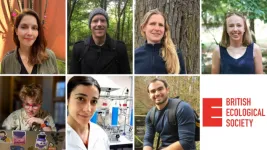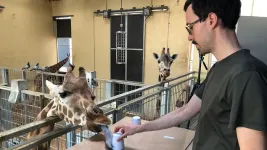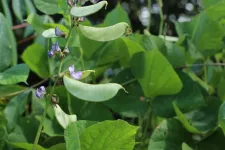(Press-News.org) Neuroscientists have uncovered how exploratory actions enable animals to learn their spatial environment more efficiently. Their findings could help build better AI agents that can learn faster and require less experience.
Researchers at the Sainsbury Wellcome Centre and Gatsby Computational Neuroscience Unit at UCL found the instinctual exploratory runs that animals carry out are not random. These purposeful actions allow mice to learn a map of the world efficiently. The study, published today in Neuron, describes how neuroscientists tested their hypothesis that the specific exploratory actions that animals undertake, such as darting quickly towards objects, are important in helping them learn how to navigate their environment.
“There are a lot of theories in psychology about how performing certain actions facilitates learning. In this study, we tested whether simply observing obstacles in an environment was enough to learn about them, or if purposeful, sensory-guided actions help animals build a cognitive map of the world,” said Professor Tiago Branco, Group Leader at the Sainsbury Wellcome Centre and corresponding author on the paper.
In previous work, scientists at SWC observed a correlation between how well animals learn to go around an obstacle and the number of times they had run to the object. In this study, Philip Shamash, SWC PhD student and first author of the paper, carried out experiments to test the impact of preventing animals from performing exploratory runs. By expressing a light-activated protein called channelrhodopsin in one part of the motor cortex, Philip was able to use optogenetic tools to prevent animals from initiating exploratory runs towards obstacles.
The team found that even though mice had spent a lot of time observing and sniffing obstacles, if they were prevented in running towards them, they did not learn. This shows that the instinctive exploratory actions themselves are helping the animals learn a map of their environment.
To explore the algorithms that the brain might be using to learn, the team worked with Sebastian Lee, a PhD student in Andrew Saxe’s lab at SWC, to run different models of reinforcement learning that people have developed for artificial agents, and observe which one most closely reproduces the mouse behaviour.
There are two main classes of reinforcement learning models: model-free and model-based. The team found that under some conditions mice act in a model-free way but under other conditions, they seem to have a model of the world. And so the researchers implemented an agent that can arbitrate between model-free and model-based. This is not necessarily how the mouse brain works, but it helped them to understand what is required in a learning algorithm to explain the behaviour.
“One of the problems with artificial intelligence is that agents need a lot of experience in order to learn something. They have to explore the environment thousands of times, whereas a real animal can learn an environment in less than ten minutes. We think this is in part because, unlike artificial agents, animals’ exploration is not random and instead focuses on salient objects. This kind of directed exploration makes the learning more efficient and so they need less experience to learn,” explain Professor Branco.
The next steps for the researchers are to explore the link between the execution of exploratory actions and the representation of subgoals. The team are now carrying out recordings in the brain to discover which areas are involved in representing subgoals and how the exploratory actions lead to the formation of the representations.
This research was funded by a Wellcome Senior Research Fellowship (214352/Z/18/Z) and by the Sainsbury Wellcome Centre Core Grant from the Gatsby Charitable Foundation and Wellcome (090843/F/09/Z), the Sainsbury Wellcome Centre PhD Programme and a Sir Henry Dale Fellowship from the Wellcome Trust and Royal Society (216386/Z/19/Z).
Source:
Read the full paper in Neuron: ‘Mice identify subgoal locations through an action-driven mapping process’ DOI: 10.1016/j.neuron.2023.03.034
Media contact:
For more information or to speak to the researchers involved, please contact:
April Cashin-Garbutt
Head of Research Communications and Engagement, Sainsbury Wellcome Centre
E: a.cashin-garbutt@ucl.ac.uk T: +44 (0)20 3108 8028
About the Sainsbury Wellcome Centre
The Sainsbury Wellcome Centre (SWC) brings together world-leading neuroscientists to generate theories about how neural circuits in the brain give rise to the fundamental processes underpinning behaviour, including perception, memory, expectation, decisions, cognition, volition and action. Funded by the Gatsby Charitable Foundation and Wellcome, SWC is located within UCL and is closely associated with the Faculties of Life Sciences and Brain Sciences. For further information, please visit: www.sainsburywellcome.org
END
Structured exploration allows biological brains to learn faster than AI
Scientists discover exploratory actions make learning more efficient
2023-04-28
ELSE PRESS RELEASES FROM THIS DATE:
Health care utilization during the pandemic among individuals born preterm
2023-04-28
About The Study: The findings of this study suggest that during the COVID-19 pandemic, children and young adults born preterm were more likely to have used health care related to COVID-19 concerns compared with their term-born peers, independent of a history of bronchopulmonary dysplasia or asthma. Further exploration of factors associated with COVID-19–related health care use may facilitate refinement of care models.
Authors: Elisabeth C. McGowan, M.D., of Brown University in Providence, Rhode Island, is the corresponding author.
To access the embargoed study: Visit our For The Media website at this link ...
Comparing physician and AI chatbot responses to patient questions
2023-04-28
About The Study: In this study of 195 randomly drawn patient questions from a social media forum, a team of licensed health care professionals compared physician’s and chatbot’s responses. The chatbot responses were preferred over physician responses and rated significantly higher for both quality and empathy. Further exploration of this technology is warranted in clinical settings, such as using chatbot to draft responses that physicians could then edit. Randomized trials could assess further if using AI assistants might ...
Treatment of children with ADHD
2023-04-28
About The Study: The results of this study of children with parent-reported attention-deficit/hyperactivity disorder (ADHD) suggest that most were not receiving ADHD medications and had never received outpatient mental health care. Gaps in treatment, which were not directly associated with socioeconomic disadvantage, underscore the challenges of improving communication and access to outpatient mental health care for children with ADHD.
Authors: Mark Olfson, M.D., M.P.H., of Columbia University and the New York State Psychiatric ...
Bentley University study shows NIH investment in new drug approvals is comparable to investment by pharmaceutical industry
2023-04-28
BENTLEY UNIVERSITY
The National Institutes of Health (NIH) spent $187 billion for basic or applied research related to 354 of the 356 drugs approved by the FDA from 2010-2019, according to a new study from Bentley University’s Center for Integration of Science and Industry. The study, published in JAMA Health Forum, shows that the amount invested per approved drug by the NIH is comparable to that of reported investment by the biopharmaceutical industry. The article, titled “Comparison of research spending on new drug approvals by the U.S. National Institutes of Health versus industry, 2010-2019,” is the first to compare the total value of NIH and ...
Six-fold increase in rural cancer screenings with remote outreach
2023-04-28
COLUMBUS – Rural women are six times more likely to get timely breast, cervical and colorectal cancer screening with remote outreach that involves interactive education and follow-up support by telephone, according to a new study.
Through the Rural Interventions for Screening Effectiveness (RISE) study, researchers with The Ohio State University Comprehensive Cancer Center – Arthur G. James Cancer Hospital and Richard J. Solove Research Institute along with researchers with the Indiana University Melvin and Bren Simon Comprehensive Cancer Center compared the effectiveness ...
Artificial photosynthesis for environmentally friendly food production
2023-04-28
Artificial photosynthesis for environmentally friendly food production
TUM researchers produce important amino acid from greenhouse gas CO2
Growing demand for food in the world
Biotechnological process via methanol as intermediate product
Less ground required than for plant cultivation
Ensuring the supply of food to the constantly growing world population and protecting the environment at the same time are often conflicting objectives. Now researchers at the Technical University of Munich (TUM) have successfully developed ...
British Ecological Society announces journal prize winners
2023-04-28
Today the British Ecological Society (BES) has announced the winners of its journal prizes for research published in 2022. The prizes are awarded for the best paper by an early career researcher in seven of the BES journals: Journal of Applied Ecology, Ecological Solutions and Evidence, Functional Ecology, People and Nature, Methods in Ecology and Evolution, Journal of Ecology and Journal of Animal Ecology.
The winning papers are selected by the Senior Editors of the journals and the awards will be presented to the winners at the BES Annual Meeting in Belfast at the end of the year.
The winners receive a prize of £250, membership of the BES, a year’s subscription to ...
Cause of heart damage from cancer drugs identified
2023-04-28
Safer cancer drugs are now one step closer after a new study led by UCL (University College London) researchers found the likely reason that some treatments damage the heart.
Modern drugs can be very effective at treating cancer and have led to greatly improved survival rates. However, some cancer treatments can cause damage to the heart, or cardiotoxicity. This damage can present in a range of ways, from a slight change in the heart’s pumping ability to debilitating heart failure. But the ways in which these drugs cause damage ...
Are the least social animals the most innovative?
2023-04-28
Innovating, i.e. the ability to find solutions to new problems or innovative solutions to known problems, it provides crucial benefits for the adaptation and the survival of human beings as well as for animals. What are the characteristics that make specific species or animals to be innovative? A study by the University of Barcelona has analysed this cognitive skill in ungulates, a group of mammals such as dromedaries, horses and goats, characterized by walking on the tip of their toes or hooves. The results show that those individuals that are less integrated ...
New bean genome unveils potential to boost food security and resilience in drought-prone regions
2023-04-28
NAIROBI, Kenya, 20 April 2023_An international team of researchers, led by Africans, has fully sequenced the genome of a climate resilient bean that could bolster food security in drought-prone regions.
The sequencing of the hyacinth bean or ‘lablab bean’ [Lablab purpureus] paves the way for wider cultivation of the crop, bringing nutritional and economic benefits, as well as much needed diversity to the global food system.
The plant is native to Africa and is cultivated throughout the tropics producing highly nutritious beans, which are used for food ...
LAST 30 PRESS RELEASES:
Reconstructing the world’s ant diversity in 3D
UMD entomologist helps bring the world’s ant diversity to life in 3D imagery
ESA’s Mars orbiters watch solar superstorm hit the Red Planet
The secret lives of catalysts: How microscopic networks power reactions
Molecular ‘catapult’ fires electrons at the limits of physics
Researcher finds evidence supporting sucrose can help manage painful procedures in infants
New study identifies key factors supporting indigenous well-being
Bureaucracy Index 2026: Business sector hit hardest
ECMWF’s portable global forecasting model OpenIFS now available for all
Yale study challenges notion that aging means decline, finds many older adults improve over time
Korean researchers enable early detection of brain disorders with a single drop of saliva!
Swipe right, but safer
Duke-NUS scientists identify more effective way to detect poultry viruses in live markets
Low-intensity treadmill exercise preconditioning mitigates post-stroke injury in mouse models
How moss helped solve a grave-robbing mystery
How much sleep do teens get? Six-seven hours.
Patients regain weight rapidly after stopping weight loss drugs – but still keep off a quarter of weight lost
GLP-1 diabetes drugs linked to reduced risk of addiction and substance-related death
Councils face industry legal threats for campaigns warning against wood burning stoves
GLP-1 medications get at the heart of addiction: study
Global trauma study highlights shared learning as interest in whole blood resurges
Almost a third of Gen Z men agree a wife should obey her husband
Trapping light on thermal photodetectors shatters speed records
New review highlights the future of tubular solid oxide fuel cells for clean energy systems
Pig farm ammonia pollution may indirectly accelerate climate warming, new study finds
Modified biochar helps compost retain nitrogen and build richer soil organic matter
First gene regulation clinical trials for epilepsy show promising results
Life-changing drug identified for children with rare epilepsy
Husker researchers collaborate to explore fear of spiders
Mayo Clinic researchers discover hidden brain map that may improve epilepsy care
[Press-News.org] Structured exploration allows biological brains to learn faster than AIScientists discover exploratory actions make learning more efficient




